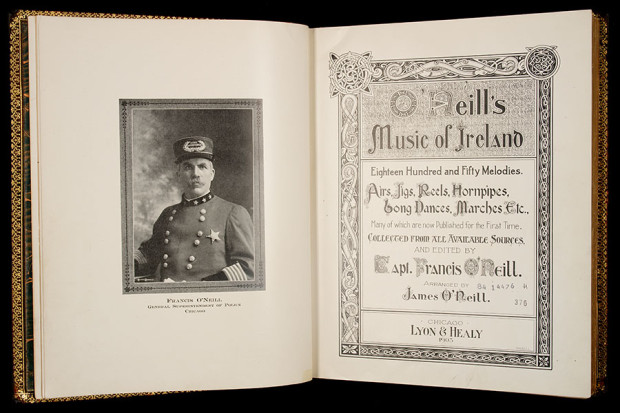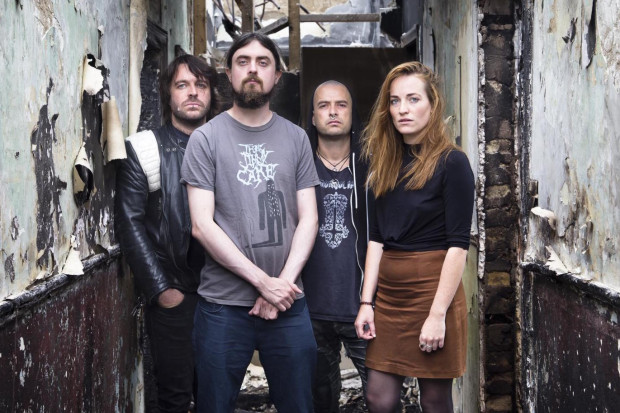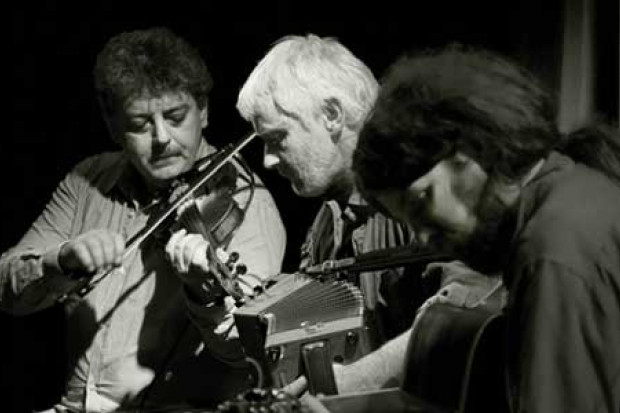Pure Bodhran – The Definitive Collection
Pure Bodhrán is a double-album compiled by Robbie Harris, released on his own label, and featuring tracks from those players who have been at the forefront of bodhrán playing over the last thirty years, namely Tommy Hayes, Ronan Ó Snodaigh, Jimmy Higgins, Damien Quinn, Donnacha Goff, Dave Donohue, Cathy Jordan, Brian Fleming, John Joe Kelly, Christy Moore, Kevin Conneff, Ringo McDonagh, Gino Lupari, Glen Velez, James McNally, Donal Lunny, Colm Murphy and Harris himself.
I want to say firstly that it is a welcome change to come across a traditional music compilation album compiled by an actual traditional musician, rather than by a marketing department from some global record company, their selection inspired by elements not much more profound than sales receipts. Harris, however, is on a different trail. If you tuned into Artzone on Lyric FM a while ago, you would have heard him speak on the growing possibility of the bodhrán becoming a more internationally recognised percussion instrument, such as the Indian tabla. Before we all scoff, has something real1y changed in accompaniment, and, if so, what does this mean for traditional music, melodists in particular? For this compilation, Harris requested that the contributors themselves would choose a track from their previous recordings for inclusion on his compilation, thus giving this album added value as a document of exactly where bodhnán players think it is at today.
The banter on accompaniment that has emanated from com-mentators in recent years suggests that bodhrán playing has now settled down in Irish music, that it sits comfortably with, in their words, the tradition. This is not quite the truth, not because of the old reasons, i.e. that melodists are rejecting it, but, quite the reverse, because bodhrán playing refuses to accept the role prescribed for it by melodists.
Traditional music’s public face persists in clinging to a hotch-potch of rules that has arisen concerning accompaniment, even though all these unwritten rules are consistently shown to be inaccurate and often useless. Unwritten rules? You know the ones: an accompanist must know the tune, provide a subtle backing, they must not be intrusive, etc. All good and well for sleeve-notes and fanzines, but no good for music making.
All this while, with the traditional music establishment paying lip-service to these maxims, bodhrán players and accompanists have worked towards a much more interesting role in traditional music making. No longer would they be the uncomfortable presence in sessions, so reliant on melodists, waiting, fidgeting, preparing for the next tune to start, and even then having to pause before entering, lest they be accused of being overeager and brainless! A new music could be developed in which they were on a par with the melody, where they were fully integrated; a much more appealing scenario, both for melodist and accompanists.
So, here is an album that illustrates how bodhrán playing has worked well in the past, how it has evolved, finally stating that things have changed and that it will not be content with a secondary role in the music. And with that, Robbie Harris has thrown down the gauntlet to traditional music. Listening to the track with Peter Brown on accordion and Harris on bodhrán, or that with Mike McGoldrick on flute and John Joe Kelly on bodhran, we can truly hear a style of music that is at home with a new set of rules, a music that doesn’t sound like accompanists and melodists are tugging in different directions.
The use of accompaniment has often been smoothed over by musicians as no radical change in policy. I beg to differ. With the developments in accompaniment, isn’t it becoming impossible to maintain a continuity in stylistic approach for melodists while hopping between solo and accompanied music? Of course, by upholding the said philosophy, musicians can say they are loyal to ‘the tradition’ and also interpret themselves as being ‘open to modern influences’. Perfect for New Ireland, but oh how boring musically! Accompaniment has changed so much that such easy options will no longer be available. Good, I say. Robbie Harris’s bodhrán-playing compilation poses a question to the music community that, eventually, must be answered.
First published in JMI: The Journal of Music in Ireland,Vol.1 No.1(Nov–Dec2000),p16.
Published on 1 November 2000
Toner Quinn is Editor of the Journal of Music. His new book, What Ireland Can Teach the World About Music, is available here. Toner will be giving a lecture exploring some of the ideas in the book on Saturday 11 May 2024 at 3pm at Farmleigh House in Dublin. For booking, visit https://bit.ly/3x2yCL8.














